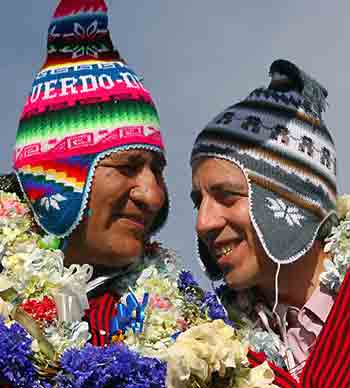latin america
Evo Morales on addressing climate change: `Save the planet from capitalism'

By Evo Morales Ayma, president of Bolivia
Venezuela: Significance of the election results and the new struggles (with audio)

Venezuela: US-backed right wing murders unionists, attacks revolutionary gains
A statement from the Australia-Venezuela Solidarity Network
November 28, 2008 -- In the aftermath of the November 23 regional elections, Venezuela’s right-wing opposition has launched, in the states it won, an all-out assault on grassroots community organisations.
President Hugo Chavez and the United Socialist Party of Venezuela (PSUV) won a clear mandate in the elections for the project to build socialism of the 21st century: the PSUV won 17 states with 5,730,774 votes nationwide, compared to the opposition’s 3,948,912 votes. The opposition’s vote was concentrated in key strategic areas, giving them the governorships of five states and the mayor of Greater Caracas.
In the days following the elections, grassroots activists in Caracas, Miranda and Tachira have reported that the public community health clinics (part of Barrio Adentro, the free universal healthcare program), communal councils and other centres where social programs operate are being shut down or attacked by opposition party, despite the public assurances of at least one right-wing govenor-elect that the legal frameworks would be respected.
Venezuela: After the regional elections, the workers propose a clean out and more revolution

Stalin Perez Borges
By Stalin Perez Borges, translated by Kiraz Janicke and Federico Fuentes for Links International Journal of Socialist Renewal
November 25, 2008 -- I want to give some preliminary and personal impressions, in the heat of the moment, where many comrades are very preoccupied by the significance of the [Chavista movement’s] loss of the Mayor of Greater Caracas and of some important or key governorships in the country.
It’s time to calm down and sit down together in order to evaluate in depth with the comrades. There are various points that we should analyse in order to draw conclusions that truly reflect reality. It is necessary to open a profound debate within the party [United Socialist Party of Venezuela – PSUV], to reflect and proceed with self-criticism, as President Chavez indicated on Sunday night.
Venezuela’s regional elections: Another vote for the revolution and Chavez (now with video, audio)
Real News Network report, November 28, 2008: The media and the Venezuelan elections -- US media covers Chavez victory and calls it a defeat
Audio: Federico Fuentes on speaks to Latin Radical about election outcomes
November 28, 2008
Making the world's poor pay: The economic crisis and the Global South
[This article is available in Spanish: ‘Que pagu

By Barry Healy & Annolies Truman, Caracas
November 22, 2008 -- Venezuela's President Hugo Chavez called for a “revolution within the revolution” at an 8000 strong United Socialist Party of Venezuela (PSUV) rally here on November 18.
Chavez called upon the PSUV ranks to hold successful PSUV candidates to account if they failed to act in the interests of the people after the election.
The rally was organised to inspire PSUV organisers and local committee members in the lead-up to the vote for state governors and local government positions on November 23. Poliedro Stadium, on the edge of Caracas, was a sea of red T-shirts and banners, and echoed with energetic revolutionary singing and chanting.
Contingents of local PSUV battalions and international solidarity groups from Argentina, Peru and Australia listened to Jorge Rodriguez, PSUV candidate for mayor of the Caracas municipality of Liberatador, and candidate for mayor of Greater Caracas, Aristobulo Isturiz.
Rodriguez was Venezuelan vice-president during 2007, while Isturiz is a former education minister.

By Álvaro García Linera, introduced and translated by Richard Fidler
In the following interview, the vice-president of Bolivia, Álvaro García Linera, explains his interpretation of the changes that were made in the draft constitution, originally drafted in December 2007 by the country’s constituent assembly, as a result of the recent negotiations involving the parties represented in Bolivia’s National Congress. A popular referendum to adopt the new draft constitution is to be held on January 25, 2009. Álvaro García Linera also discusses his view of the role of constitutional change in the social transformation of Bolivia that is now under way.
On the spot reports from Venezuela: Right-wing seeks to undermine November 23 elections
Below Green Left Weekly/Links Caracas correspondent Federico Fuentes speaks to Latin Radical about developments and possible outcomes of Novembe
